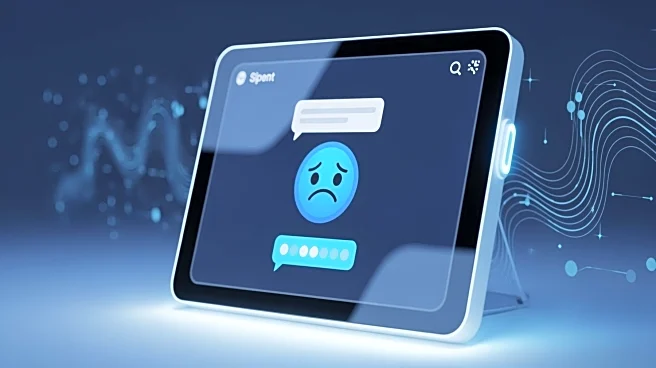What's Happening?
A recent experience with customer service chatbots highlights the challenges faced by users when dealing with automated systems. The incident involved a user who canceled a taxi booking due to unexpected
traffic caused by President Trump's visit, resulting in a gridlock. Despite the circumstances, the user was charged a $10 cancellation fee for not providing an hour's notice. Attempts to resolve the issue through the company's chatbot were unsuccessful, as the chatbot enforced company policy and denied access to human assistance. This situation exemplifies the growing reliance on chatbots in customer service, often leading to user frustration and unresolved issues.
Why It's Important?
The increasing use of chatbots in customer service reflects a broader trend towards automation in business operations. While chatbots can reduce costs and improve efficiency, they often fail to address complex customer issues, leading to dissatisfaction. This reliance on automated systems can damage customer relationships and brand reputation, as users feel neglected and unsupported. Companies must balance cost-saving measures with effective customer service to maintain trust and loyalty. The incident underscores the need for businesses to evaluate the effectiveness of their customer service strategies and consider integrating human support to address complex queries.
What's Next?
As businesses continue to adopt chatbots, there may be a push for improved AI capabilities to better handle customer inquiries. Companies might also reconsider their customer service models, integrating human support for complex issues. This could lead to a hybrid approach, combining automation with personalized service. Additionally, regulatory bodies may scrutinize the use of chatbots, ensuring consumer protection and fair practices. The evolution of customer service technology will likely focus on enhancing user experience and satisfaction, balancing efficiency with empathy.
Beyond the Headlines
The ethical implications of relying on chatbots for customer service are significant. Automated systems can lead to a lack of accountability, as users struggle to resolve issues without human intervention. This raises questions about the fairness and transparency of business practices. Furthermore, the cultural shift towards automation may impact employment, as companies reduce human roles in favor of AI solutions. The long-term effects on society and the workforce warrant consideration, as businesses navigate the balance between technological advancement and human interaction.









